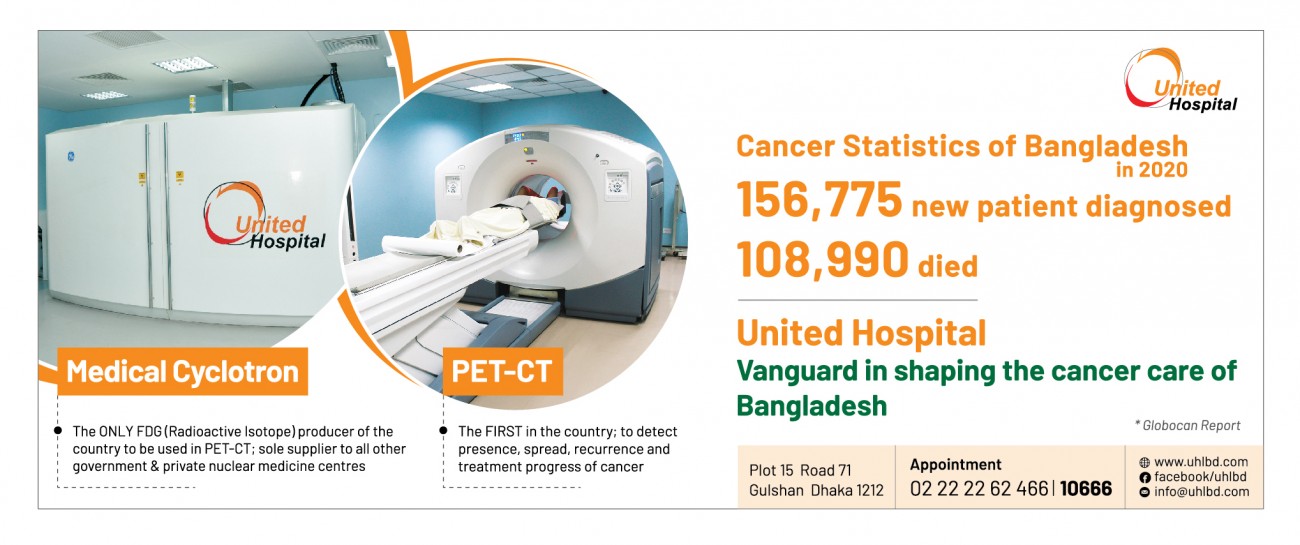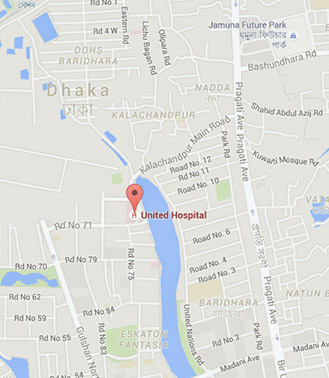Medical Cyclotron and PET CT at United Hospital, vanguard in reshaping cancer care

On the basement floor of the United Hospital, one will find many highly specialized state-of-the-art medical equipment where the Nuclear Medicine and Radiation (radiotherapy) wings are located. United Hospital Cancer Care Centre is entirely devoted to provide cancer patients with the most effective range of innovative cancer diagnosis and treatment available. It is the first vanguard hospital playing pioneering role in reshaping the cancer care of Bangladesh as it introduced back in 2011 the first PET-CT scanner and Medical Cyclotron to produce FDG (Fludeoxyglucose), the radioactive isotope which is used in PET-CT scan to detect the presence, spread, recurrence and treatment progress of cancer.
United Hospital Cancer Care Centre is committed to improving the quality of life of cancer patients and survivors and to spread cancer awareness with fellow professionals, corporate partners and the community at large.
In order to provide complete cancer care, the hospital had to invest in highly specialized medical technological equipment. United Hospital foresaw the great benefit of acquiring a Positron Emission Tomography - Computed Tomography (or PET-CT) at that time. A diagnostic tool at the molecular level such as PET-CT is vital to provide a comprehensive treatment of cancer. The most expensive and complicated medical equipment that United Hospital invested in at the time were the PET-CT, Medical Cyclotron and two Medical Linear Accelerator machines, one of which is world-class latest equipment (True Beam). These now sit on the basement floor of United Hospital.
PET-CT is nuclear imaging technology which requires the administration of a PET radiopharmaceutical. The most commonly used PET radiopharmaceutical is the F-18 FDG (Fludeoxyglucose) which is a cyclotron-produced isotope with a half-life of 110 minutes. Before 2011, at that time, there were no medical cyclotrons available in Bangladesh. So in order to provide PET examinations for patients, a medical cyclotron and hot lab were needed to produce PET radiopharmaceuticals.
Establishing a PET-CT and Cyclotron facility is a very complicated project. It needs a lot of effort, dedication, excellent planning, with specialist advice from highly qualified personnel. Many experts in the field of nuclear medicine in Bangladesh were consulted at the time for helping to set up the cyclotron, the hot lab and the production of radiopharmaceuticals. Since this was the very first PET-CT and Cyclotron facility in Bangladesh, not many people had the technical capability to handle this delicate equipment. All of the people who worked on this project were very new to the technology, facing challenges over the management of PET-CT radio pharmaceutical process at that time. United Hospital has hired engineers, chemists and pharmacists to form a PET radiopharmaceutical production team and arranged the necessary training for them from both on-site and abroad. Monthly meetings with hospital staff and engineers were arranged to solve any problems related to facility environment such as room temperature, humidity, electricity, and chilled water system etc. A system to monitor room temperature, humidity and pressure was installed. The production team has implemented many continuous quality improvement projects to improve production processes and to cut costs.
The PET-CT project was also quite a difficult task for the team. The PET-CT at United Hospital Cancer Care Centre is the first PET-CT in Bangladesh. It was a very new and very sophisticated technology at that time. Not many people in the medical field were familiar with the technology. Many members of the general public had never heard of PET-CT at that time. A medical team for PET-CT was put together for the PET-CT project at United Hospital during its installation at the beginning of 2011. The team had to plan for training and education for team members as well as for raising awareness of all related medical staff, marketing staff and the general public. Briefings were scheduled every day between the management team, support team and medical team to keep everyone informed about the ongoing process and any problems to resolve.
The PET-CT was installed in the basement of United Hospital. Many documents and related medical equipment needed to be drafted to prepare for the opening of the PET-CT service. The facility also had to be arranged according to a radiation safety program. Staff members were trained in risk assessment and in the safe use of radioactive substances. In terms of PET-CT installation and commissioning, a medical physicist had to check and calibrate the system working with engineers from abroad. Physicians familiar with PET-CT who knew how to use PET-CT properly needed to be sourced from home and abroad. The hospital marketing team has arranged several seminars in hospitals and public arenas for Dr. Molla Abdul Wahab, Senior Consultant Nuclear Medicine to talk about PET-CT and to present the clinical uses of PET-CT.
With a great contribution from the team who has put in an enormous effort to make the PET-CT service available for the first time in Bangladesh, working around the difficulties and problems, the PET-CT service was successfully established in 2011 for the use of patients. The team includes physicians, physicists, technicians, nurses, engineers, chemists, and management staff. They worked continuously to improve the quality of services and the quality of processes to keep up with international standards. By developing necessary skill and acquiring important knowledge about PET-CT and Medical Cyclotron produced radiopharmaceuticals (FDG), United Hospital not only has saved country's foreign currency as countrymen can avail world class cancer diagnostic facility without the need to go abroad; further it has over the years shared its valuable knowledge with a wide group of professionals in medical circles, says Dr Wahab, Senior Consultant Nuclear Medicine of United Hospital.




